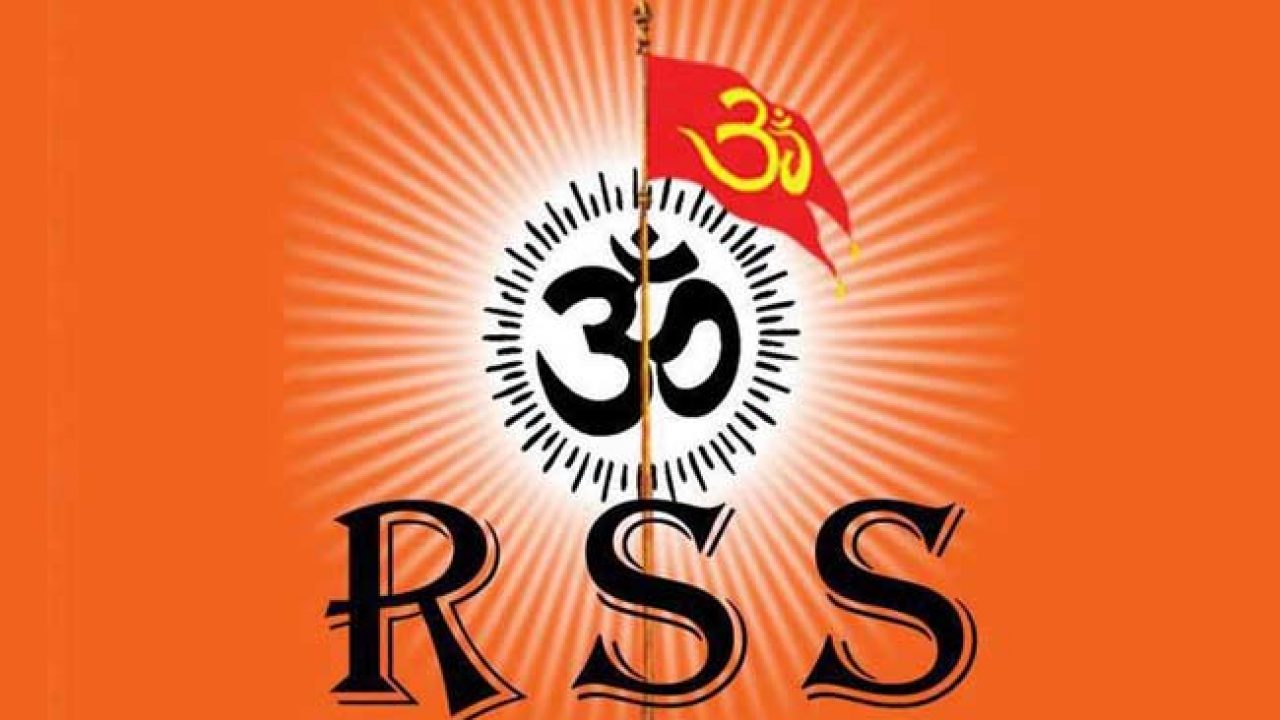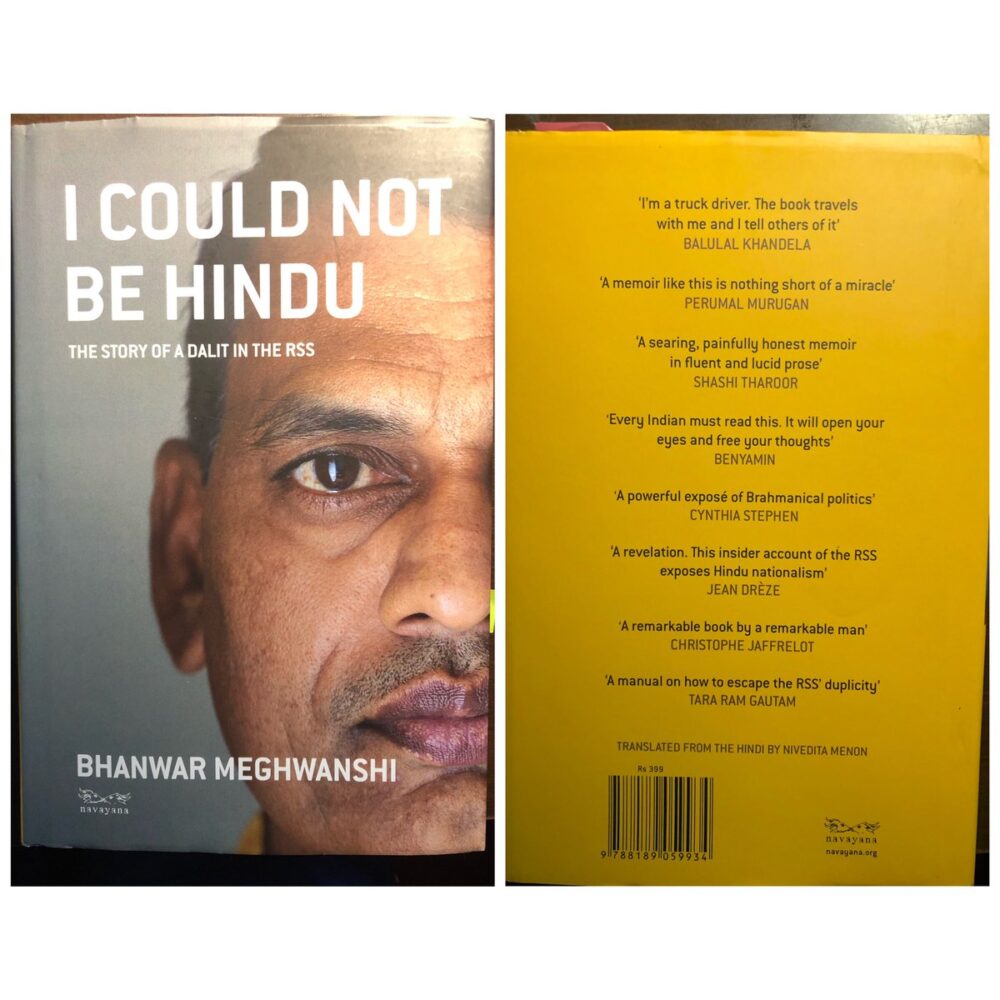Till date, few ex-swayamsevaks had narrated what had been their experience in the Sangh and presented the reasons why they had left it. But this bookman, Bhanwar Meghwanshi, who wrote a book on his experience based on his personal experience, being a member of RSS, titled as ‘I Could Not Be Hindu: The Story of a Dalit in the RSS’ is unique in its way. First, it is written by a former RSS member who has become a radical critique of the organisation and who explains why in detail. Second, this book has been written by a Dalit, Bhanwar Meghwanshi, who enlightens the reader about the situation of the Scheduled Castes within the Sangh Parivar and in today’s Indian society at large.

Rashtriya Swayamsevak Sangh, abbreviated as RSS, is an Indian right-wing, Hindu nationalist, paramilitary volunteer organisation. RSS was founded on 27 September 1925. As of 2014, it has a membership of 5–6 million. Indeed, the RSS has never explicitly denounced the caste system but attempted to reform it in order to preserve its basic structure. The RSS was partly a reaction to the rise of Dalit politics under the aegis of Ambedkar whose first anti-caste mobilisations (including the Mahad satyagraha and temple entry movements) also took place in what is today Maharashtra.
Caste system prevailed in our Indian society when Aryans came and started settling in the Sub-continent, its roots were placed in Rig Vedic period but at that time caste was according to the profession, but as the time passed a modification were made, things got reversed, from later Vedic period, professions were fixed according to birth, according to the caste. From then till now, we are unable to completely cut off this caste barrier from our society.

This book is an outsider’s perspective of an inside man. It is a hard-toned, confessional paradox of an ex-sanghi, who hoped for justice in a Brahmin republic. Through his life story, the author immaculately sheds light on independent Dalit cultures, religions, lifestyles, and heterodox spiritual practices that have existed for millennia bereft of any Brahmin-Hindu control.
Bhanwar Meghwanshi was a devoted bhakt of the Rashtriya Swayamsevak Sangh and joined the organisation at the tender age of 13, lured by the promises of equality. He was a hardworking cadre who wanted to give his life for a rightful cause in the service of Bharat Mata and if that meant taking down the rowdy ‘Muslim traitors’ so be it. He has gradually presented the history and the culture of his society in a manner which made him proud of being a Hindu and angry because of the decline of the sons of the (sacred) soil of Hindustan – which was largely attributed by his teachers to the “Muslim invasions”.
In Bhanwar Meghwanshi’s village, low caste people joined the RSS in large numbers. They remained for ideological reasons too as, gradually, they learnt that their culture was threatened by others, primarily by Muslims and Christians.
Bhanwar Meghwanshi recalls that while in the Sangh he “heard a lot about weapons being stored in the basements of mosques” and that getting rid of the Babri Masjid was like “a second battle for independence”. Bhanwar Meghwanshi took part in the Ram janmabhoomi movement in the early 1990s with a great sense of pride as if defending this symbol of Hinduism promoted his self-esteem. Meghwanshi nearly escaped death while on his way to tear down the symbol of Muslim rule. His survival offered him a preview into his beloved organisation’s terror-filled, hypocritical actions. As a Dalit, Meghwanshi couldn’t escape his caste identity in the Hindu brotherhood of the RSS but he chose to ignore it for a larger cause — the nation.

However, one incident shook his belief, when his senior functionaries in the organisation and religious sadhus refused to consume food in his house. They urged him to pack the food instead and would consume it on their way. Maheshwari didn’t mind it much and obeyed the orders. But the next day he discovered that his home-cooked food was thrown on the streets left for animals to consume. At that moment, reality hit a big slap in his face when he was put right in his place as a polluted untouchable. Hurt and betrayed, Meghwanshi appealed to his organisation. Surprisingly, no one heard his plea from the local level right up to Nagpur, the headquarters of the RSS.
‘I Could Not Be Hindu’ is a sad statement on the rightwing group whose legitimacy is yet again put to question by the passionate voice of a brave Dalit. The style of writing is so lucid that it can be read at one sitting. The strength of the book lies in its morally honest, justice-seeking call to action.
![Why a Dalit cannot be a Hindu: Banwar Meghwanshi's book unveils the truth behind RSS's Hindu Ekta Cartoon] #RSS: Rashtriya Schutzstaffel – Rebel Politik](https://rebelpolitikblog.files.wordpress.com/2018/01/img_3495.png?w=350&h=200&crop=1)
United we stand, divided we fall!!
Many times, we have heard people demanding for promotion of only one religion and taking India as land, only meant for Hindus. Whilst many didn’t even know that ‘Hindu’ is a term that was initially used to identify Indians. India is a land where different schools of thought prevail but yet every thought is considered equally important. If there was only one religion in India, then also there would be differences in people’s thinking Because religion is followed by humans and humans have their own mind and the beauty of our nation lies in unity in diversity; different yet United. This remarkable book by a remarkable man teaches the reader a life lesson, as it is as moving as informative. The last words of the book suggest that he remained fully determined as he says, “Nevertheless I will speak, I will write, and I will always stand up, speak out, and fight the battle against injustice, oppression, exploitation and inequality.
Inquilab zindabad—Long live the revolution! “
Also read- Nation Together In COVID Pandemic: RSS From Plasma Donation To Conducting Last Rites
Source: The Print
[zombify_post]








